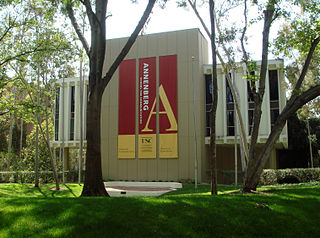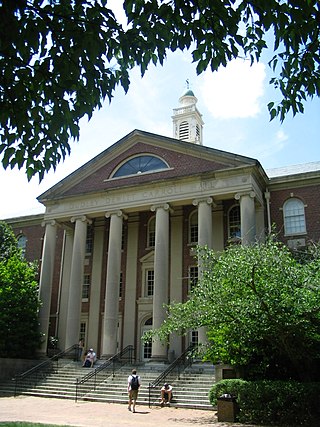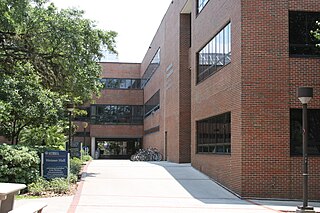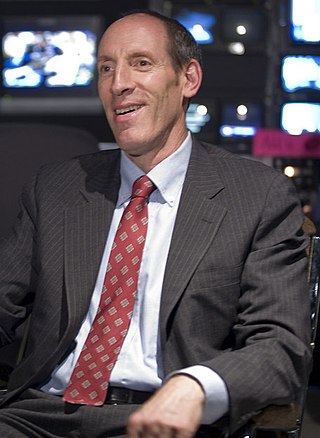Willard D. "Wick" Rowland is an American executive who is president and CEO emeritus of Colorado Public Television (KBDI/12), a PBS station in Denver, Colorado. He is professor emeritus and dean emeritus of the University of Colorado at Boulder.
Willard D. "Wick" Rowland is an American executive who is president and CEO emeritus of Colorado Public Television (KBDI/12), a PBS station in Denver, Colorado. He is professor emeritus and dean emeritus of the University of Colorado at Boulder.
Rowland holds a BA in history from Stanford University, an MA in communication from the Annenberg School for Communication at the University of Pennsylvania, and a Ph.D. from the Institute for Communications Research at the University of Illinois at Urbana-Champaign.[ citation needed ] He was conferred as dean emeritus and professor emeritus by University of Colorado at Boulder and is a research scholar in the fields of public broadcasting in the US, mass communications and violence in the media. He attended the Catlin-Gabel school in Portland, Oregon and graduated from the St. Paul's School in Concord, New Hampshire.
Rowland was granted a Fulbright Specialist placement in the field of broadcasting, media policy development and communication/journalism education in Ethiopia.
Rowland served as a Peace Corps volunteer in Jamaica working in instructional broadcasting and adult literacy projects. “I wasn’t on the ground more than three weeks before I realized that I needed a much deeper education in media and development policy. The then ‘dominant paradigm’ didn’t explain much of what I was experiencing in the Jamaican bush. Coming to Annenberg gave me a chance to begin developing a whole new, more critical and culturally conscious approach to media history and policy issues, particularly with regard to public service questions." [1]
Rowland served as dean of the University of Colorado at Boulder School of Journalism and Mass Communication from 1987 to 1999. [2] He was conferred as dean emeritus and professor emeritus status by the University of Colorado. In August 1999, he was named president of KBDI/12. [3] Rowland was named "Television Person of the Year" by "The Denver Post" for 2010. [4]
Rowland was the first vice-president of research during the early days of PBS. That is where he coined the phrase "closed-captioning" for the newly developed process for transmitting the written word on a television screen for the hearing impaired.[ citation needed ]
In Variety on January 22, 2011 [5] he was quoted as saying, "You're spending a great deal of political capital on the Hill just to keep what you've got, instead of being able to look ahead to growing the pie. That's probably the most serious and misunderstood consequence of these periodic bouts that we have. I used to think that they were just periodic events of no significance, but now I think it's a way of keeping a lid on (us)."
In his writings, he suggests how the system could equip itself to develop a more coherent, visionary agenda for its own future and the nation’s media policies." Rowland testified before Congress in February 2009 about the Satellite Home Viewing Extension Reauthorization Act (SHVERA) on behalf of PBS. [6]
{{cite book}}: |work= ignored (help)Rocky Mountain PBS is a network of PBS member television stations serving the U.S. state of Colorado. Headquartered in Denver, it is operated by Rocky Mountain Public Media, Inc., a non-profit organization which holds the licenses for most of the PBS member stations licensed in the state, with the exception of KBDI-TV in Broomfield, which serves as the Denver market's secondary PBS station through the network's Program Differentiation Plan. The network comprises five full-power stations—flagship station KRMA-TV in Denver and satellites KTSC in Pueblo, KRMJ in Grand Junction, KRMU in Durango and KRMZ in Steamboat Springs. The broadcast signals of the five full-power stations and 60 translators cover almost all of the state, as well as parts of Wyoming, Montana, Nebraska and New Mexico.

Elihu Katz was an American-Israeli sociologist and communication scientist whose expertise was uses and gratifications theory. He authored over 20 books and 175 articles and book chapters during his lifetime and is acknowledged as one of "the founding fathers of regular television broadcasts in Israel."

George Gerbner was a professor of communication and the founder of cultivation theory. He taught at Temple University, Villanova University, and the University of Pennsylvania.

The USC Annenberg School for Communication and Journalism comprises a School of Communication and a School of Journalism at the University of Southern California (USC). Starting July 2017, the school's Dean is Willow Bay, succeeding Ernest J. Wilson III. The graduate program in Communication is consistently ranked first according to the QS World University Rankings.

The Annenberg School for Communication is the communication school at the University of Pennsylvania. The school was established in 1958 by Wharton School alum Walter Annenberg as the Annenberg School of Communications. The name was changed to its current title in 1990.

Mass media are the means through which information is transmitted to a large audience. This includes newspapers, television, radio, and more recently the Internet. Organizations that provide news through mass media in the United States are collectively known as the news media in the United States.
KBDI-TV is a PBS member television station licensed to Broomfield, Colorado, United States, serving the Denver area. The station is owned by Colorado Public Television, Inc. KBDI-TV's studios are located at Welton and 29th Streets in the Five Points neighborhood. Its transmitter is located atop Squaw Mountain.
Nicholas J. Cull is a historian and professor in the Master's in Public Diplomacy program at the Annenberg School for Communication and Journalism at the University of Southern California. He was the founding director of this program and ran it from 2005 to 2019.
Michael Tracey is a British-American academic and television producer with a specialty in public service broadcasting. He acquired notability as a result of his tenure as the head of the Broadcasting Research Unit in London, a British think tank dealing with media issues, and later with his investigative reporting on the death of JonBenét Ramsey. He is the author of The Decline and Fall of Public Service Broadcasting and the Production of Political Television. He is currently a professor at the University of Colorado at Boulder.

The UNC Hussman School of Journalism and Media is a nationally accredited professional undergraduate and graduate level journalism school at the University of North Carolina at Chapel Hill. The school, founded in 1950, is ranked competitively among the best journalism schools in the United States. The school offers undergraduate degrees in media & journalism as well as advertising & public relations. It offers master's degrees in journalism, strategic communication, and visual communication and doctoral degrees in media & communication.

The College of Journalism and Communications (CJC) is an academic college of the University of Florida. The centerpiece of the journalism programs at UF is WUFT, which consists of both a WUFT (TV) Public Broadcasting Service (PBS) Public television and WUFT-FM NPR public radio station. The commercial broadcasting radio station, WRUF, is also one of the oldest stations in the state.

Aaron Harber is an American long-form political TV talk show host featured on KCDO-TV Channel 3 Colorado, COMCAST Entertainment Television, and KPXC-TV, as well as on individual stations. Harber often writes columns for The Colorado Statesman, The Denver Daily News and the Huffington Post, and has served as an on-air, political analyst for the Denver CBS affiliate, CBS4 (KCNC-TV), the CW2 Network, Tribune Broadcasting, and KBDI-TV Channel 12.
Ethics in America was a ten-part television series, originally aired from 1988 to 1989, in which panels of leading intellectuals from various professions discussed the ethical implications of hypothetical scenarios, which often touched on politics, the media, medicine, and law. The panels were moderated by law professors from leading law schools.
KTSC is a television station on channel 8 in Pueblo, Colorado, United States. Owned by Rocky Mountain Public Media, Inc., it is one of the five full-service transmitters of the Rocky Mountain PBS state network, broadcasting from atop Cheyenne Mountain between Pueblo and Colorado Springs. Master control and internal operations are based at Rocky Mountain PBS' headquarters in the Buell Public Media Center in downtown Denver; some regional programming is produced at the Buell Communications Center on the campus of Colorado State University Pueblo. RMPBS also maintains a Regional Innovation Center in Colorado Springs on the campus of Colorado College.

Jonathan Trumbull Taplin is an American writer, film producer and scholar. He was born in Cleveland, Ohio, and has lived in Los Angeles since 1973. Taplin graduated from Princeton University in 1969 and is the Director Emeritus of the Annenberg Innovation Lab at the University of Southern California Annenberg School for Communication and Journalism. Taplin is Chairman of the Board of the Americana Music Foundation.
Monroe Edwin Price was director of the University of Pennsylvania's Center for Global Communication Studies (CGCS) at the Annenberg School for Communication at the University of Pennsylvania and director of the Stanhope Centre for Communications Policy Research in London.
Stuart N. Brotman is an American government policymaker; tenured university professor; management consultant; lawyer; author and editorial adviser; and non-profit organization executive. He has served in four Presidential Administrations on a bipartisan basis and taught students from 42 countries in six separate disciplines — Communications, Journalism, Business, Law, International Relations and Public Policy. He also has advised private and public sector clients in more than 30 countries in five continents.
The Center for Global Communication Studies (CGCS) is a research center located within the Annenberg School for Communication at the University of Pennsylvania. CGCS serves as a research hub for students and scholars worldwide studying comparative communication studies, media law, and media policy. The center also provides consulting and advisory assistance to academic centers, non-governmental organizations, regulators, lawyers, and governments throughout the world.
Stewart M. Hoover is a Professor of Media Studies and Professor Adjoint of Religious Studies at the University of Colorado at Boulder. He is the founder and director of the Center for Media, Religion and Culture. His research interest centers on media audience and reception studies rooted in cultural studies, anthropology and qualitative sociology. He is known for his work on media and religion, particularly in the phenomenon of televangelism, and later in religion journalism. His most recent work involves household-level studies of media audience practices of meaning-making and identity. Supported by a series of grants from the Lilly Endowment and the Ford Foundation, this work investigates the extent to which the media sphere as a whole and the various media which comprise it constitute a central site of meaning practice in contemporary domestic and global life. Through the center he directs, he has also become influential in scholarly discourses about the public understanding and role of religion globally and the ways those are rooted in its mediation.
Willard ("Wick") Rowland Jr. has been named president and general manager of KBDI-Channel 12, the smaller and edgier of Denver's two public television stations.
{{cite web}}: CS1 maint: archived copy as title (link)Willard D. ("Wick") Rowland, president and CEO of Colorado Public Television and KBDI in Denver, was presented the 2009 Advocacy Award by the Association of America's Public Television Stations.